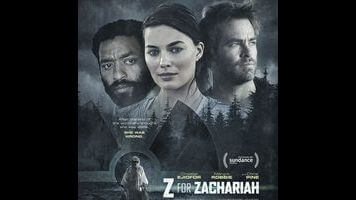For a while, Zobel’s movie follows O’Brien’s narrative fairly closely, though the age of the female lead, Ann, has been bumped up from 16 to however old one thinks Margot Robbie looks. (She’s 25.) So far as Ann knows, she’s the sole survivor of some cataclysmic event—most likely nuclear war, though the film doesn’t specify—that’s made most of the planet’s surface lethally radioactive. A geographical anomaly protects the valley where Ann lives, however, and one day this valley is discovered by a wanderer in a radiation suit, John (Chiwetel Ejiofor), who’s overjoyed to find breathable air. Ann is the first living human he’s found, and the two sensibly band together, with John suggesting the construction of a water wheel that could power a generator and restore electricity to the valley. Screenwriter Nissar Modi adds a new wrinkle here, creating a schism between devout Ann and secular John by having the only available source of lumber be a chapel built by Ann’s father. The invented conflict respects the source material, though, merely serving as an additional strain on the already tense, romantic-yet-creepy central relationship.
And then Caleb shows up, in the form of Chris Pine. There is no Caleb in the book. That’s not necessarily a dealbreaker—last year’s Under The Skin, for example, bears little resemblance to the Michel Faber novel that inspired it, and was superb nonetheless. But this hunky coal miner, who miraculously survived by staying deep underground for months, brings nothing to Z For Zachariah apart from the third point of a banal love triangle. His presence means that Ann, rather than being a vulnerable teenager uncertain whether she can trust the only other human being around—and aware that rejecting his help entails potentially being completely alone forever—now becomes an adult woman torn between the ardent man of science who’s eager to reboot civilization and the strapping fella who shares her faith and moral values. This makes for a pointed contemporary allegory, perhaps, but it’s just about the least interesting way imaginable to explore the end of the world, and it all but scuttles the fine work Robbie and Ejiofor had been doing as a duet. As a director, Zobel (Great World Of Sound, Compliance) has built his career on taking bold chances, but signing on to helm an aggressively re-conceived, dramatically tepid take on a beloved novel wasn’t his savviest move.

